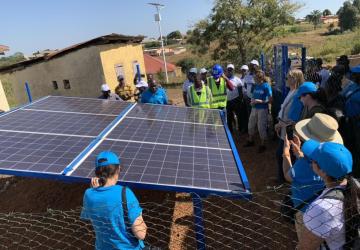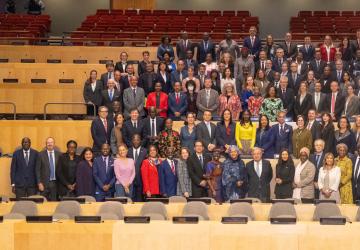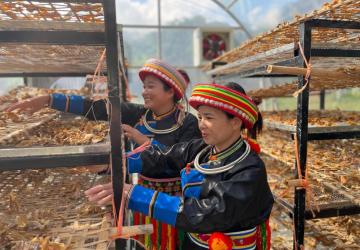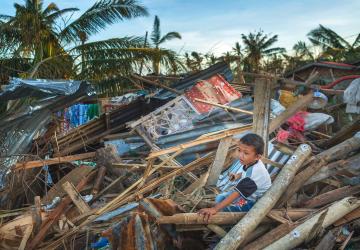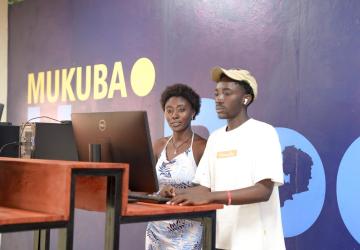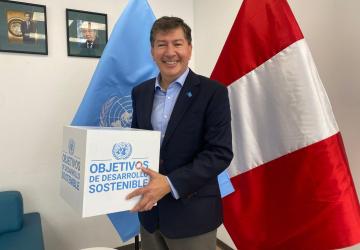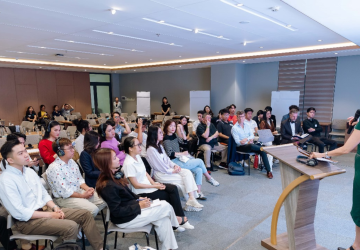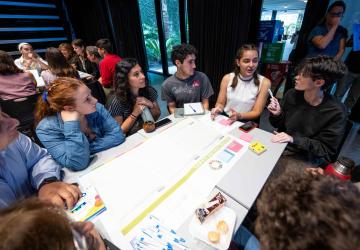Empowering Tomorrow: Women and Youth at the Heart of Sustainable Development

In the race to accelerate the Sustainable Development Goals (SDGs), the United Nations Development Coordination Office (UNDCO) and the Resident Coordinator system are blazing a trail, with women and youth at the helm. Their mission? To prove that meaningful participation from these often-overlooked demographics is not just essential—it's the key to unlocking real change. Our emphasis on inclusive consultations and empowerment initiatives goes beyond simply reflecting a commitment to equity. It is a powerful catalyst, sparking broader system-wide change that begins at the country level.
Involving women and youth is at the heart of this movement. Resident Coordinators (RC) play a pivotal role in orchestrating a unified approach within the UN system and its specialized agencies to advance this inclusive vision. They draw on the strengths of each UN entity – at global, regional and country level—to craft a comprehensive response that addresses local needs to ensure no one is left behind, with development actions deeply rooted in local realities.
Young people as architects of change
Young people are being hailed as architects of change. The RC system's dedication to youth engagement goes beyond the work of individual agencies and aligns directly with the UN Youth 2030 Strategy to advance the rights and agency of young people worldwide. An impressive 94 per cent of countries’ “sustainable development needs assessments”, or Common Country Analyses, and the subsequent “roadmap to accelerate the SDGs”, the UN Sustainable Development Cooperation Frameworks, now prioritize a focus on youth. Accordingly, 70 per cent of all Cooperation Frameworks prepared in 2023, were done in consultation with young people. By integrating youth input into these core documents, RCs ensure that UN programming isn't just about young people but designed with them and for them.

Our work in Bhutan and Guinea, demonstrate the deep commitment of new generation UN teams on the ground to actively engage young people. In Bhutan, the Resident Coordinator's office (RCO) surveyed 40,000 young people. This combined both in-person and social media outreach to ensure inclusivity. These efforts result in UN programming that better aligns with their needs and reflects their aspirations. Similarly, in Guinea, the RCO facilitated consultations with over 1,000 young people, whose perspectives were integrated into the Common Country Analysis.
In Egypt, youth perspectives are now informing national climate policies, also thanks to the RC’s convening of a Youth Climate Change Committee. The RC efforts mobilized partnerships to bridge the gap between young stakeholders and national leadership.
Beyond consultations, RCs actively see young people as an important audience for advocacy and around the globe are leveraging media platforms to shift mindsets and generate public support for youth-led initiatives. In China, strategic media partnerships orchestrated by the RCO resulted in an online event focusing on the Sustainable Development Goals (SDGs), reaching 42 million young viewers.
From ensuring youth have a seat in policy discussions and decision-making, to crafting targeted outreach strategies, Resident Coordinator’s Offices are empowering young people to become active architects of our common futures.
Championing equality
Meanwhile, gender equality isn't just a buzzword—it enables gains for all of society. On the ground, RCs ensure that commitments translate into action. In 2023, under the leadership of RCs, 97 UN country teams reported concrete actions across various sectors, ensuring that gender considerations are woven into the fabric of every UN programme – holding themselves and UN entities in-country accountable through the System-Wide Action Plan (SWAP) for gender equality.
Accountability tools, like the mandatory UN Gender Equality Marker, applied by 91 UN country teams in 2023 push for funding to backup commitments. Based on the marker, 41 per cent of UN country teams are now meeting the ambitious target of allocating 70 per cent of resources to gender sensitive activities.

In The Gambia, under the leadership of the RC, the UN team secured US$2 million from the Peacebuilding Fund to launch a project amplifying women's voices at all levels of decision-making. This shows how RCs channel resources to ensure that women are active leaders in shaping the future we want.
Safeguarding rights is essential, but RCs champion an approach that goes further—empowering women's leadership and ensuring their voices shape the decisions that affect their lives. The RC-led Spotlight Initiative to End Violence against Women and Girls has resulted in the adoption of nearly 500 laws and policies protecting women and girls in 26 countries. By galvanizing the UN system and external partners, RCs turn the promise of protection into tangible legal safeguards.
Leaving no one behind
Throughout 2023, RCs have championed inclusion throughout UN operations at the country level. This aligns directly with the Sustainable Development Goals' central principle of leaving no one behind. In Uganda, the RC system ensured various organizations representing persons with disabilities, including the National Union of Women with Disabilities, were active contributors to the Cooperation Framework 2021-2025. This shows that those most marginalized benefit when they are active participants in creating solutions.
As the international community focuses on the Summit of the Future, the RC system offers proven global action blueprints, thanks largely to their on-the-ground leadership. The challenges we face – from climate change to economic inequality – disproportionately affect young people and women. Empowering them goes beyond inclusion, it is about leveraging their contributions to benefit all.
The 2024 Report of the Chair of the UN Sustainable Development Group on the Development Coordination Office highlights these efforts and more, demonstrating how Resident Coordinators are driving a future marked by collaboration, equity, and the unstoppable power of those with the most at stake.
Read the 2024 UNSDG Chair Report here.




